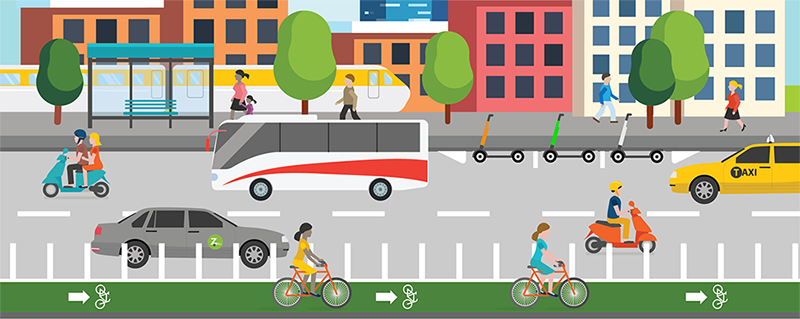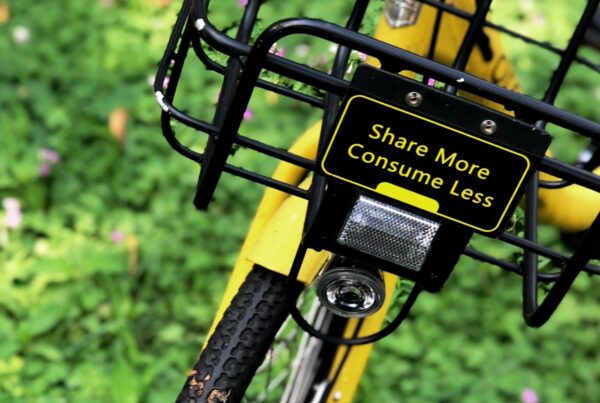Welcome to the Shared-Use Mobility Center’s weekly guide to the most impactful news, thought-provoking articles and innovative technologies that are shaping our transportation future. We believe in sharing information, just like sharing cars, bikes, and scooters, so if there’s anything additional you’d like to see, just drop us a line.
SUMC News and Announcements

The series kicked off on October 27 with the Mobility Hubs to Connect Communities Webinar and Workshop
This two-part virtual event featured presentations of mobility hubs projects led by nonprofit organizations, a metropolitan planning organization, and city governments from the United States and Europe; then broke out into discussion sessions focused on mobility hubs in four different contexts: Regional, City, Community, and European. Watch the recording and learn more about this event on the MOD Learning Center.
Next in our Series:
How States are Moving the Emissions Needle
A webinar and workshop on policy tools to decarbonize transportation
Friday, November 20th, at 10:30 am Pacific/12:30 pm Central/1:30 pm Eastern
Mark your calendars for this action-oriented discussion on state and multi-state tools for reducing greenhouse gas emissions, funding sustainable transportation, and enacting policy change. It features speakers from the Georgetown Climate Center, the California Air Resources Board, and Our Streets Minneapolis, as well as breakout sessions on advancing change in the statehouse, the interaction between state and local government, and funding the efforts needed for change. Register here and stay tuned for exciting details.
New on the MOD Learning Center: Shared Mobility Funding Strategies Learning Module
Yes, governments (federal and subsequently state and local) provide a substantial amount of funding for transit agency operations and transportation initiatives. But as the shared mobility industry is well aware, this is often not enough for both operations and service improvements, especially with heightened safety measures and ridership drops due to the ongoing pandemic.
In this light, the Funding Strategies Learning Module was designed to be a functional guide and glossary of funding possibilities. Organized by “traditional” and “innovative” government and partnership strategies, it offers examples of bikeshare, carshare, microtransit, mobile integration, multimodal transportation, paratransit, and public transit examples from six US cities. Explore the Learning Module.
Transportation is on the ballot
A lot is riding on this election. Funding for cities and transportation agencies, federal climate policy, infrastructure priorities, and more will be shaped by the results of the US Presidential Election on November 3, 2020. Knowing the importance of getting out the vote, ridehailing companies, cities, and voting rights groups are offering options to help you get to the polls.
For live election results with a transportation focus, our friends at the Overhead Wire will be streaming updates on YouTube.
Events on our radar:
CoMoUK’s Collaborative Mobility Virtual Conference 2020
November 17-20, 2020
CoMoUK, which leads integrated mobility solutions designed for the public good in the UK, is holding their conference virtually this year. The 4-day-event will feature 8 sessions and over 35 speakers addressing topics including COVID-19 and mobility, decarbonization, urban micro-mobility, community mobility hubs, sustainable rural transport, strategy and procurement, and the vision for 2025. Learn more and register for this free event.
UIC’s Urban Transportation Center is hosting an exploration of “humanistic” planning practices as part of their Fall 2020 Seminar Series. “Measuring, Managing, and Maximizing Transportation Happiness Using Smartphone-Aided Day Reconstruction Method” will feature Dr. Yingling Fan, Professor of Urban and Regional Planning at the University of Minnesota. Registration is complimentary.
Mobility Justice
The modern US streetcar: a quaint travel option for tourists in mostly-white areas, not a useful, reliable transit service for Black communities, finds this new study about “colorblind” transit planning in the Journal of Race, Ethnicity and the City.
The Active Transportation Alliance recommends key racial equity strategies to combat the disproportionate burdens that Black and Brown neighborhoods in Chicago face in fatal auto crashes and speed violation enforcement in light of Mayor Lightfoot’s proposed lowering of the ticketing threshold for speed cameras from 10 mph to 6 mph.
The Proposition A ballot measure in Austin, TX targets massive investment in transit infrastructure for the city, but the effects of decades of gentrification and displacement have left low-income, POC communities skeptical of promises by city leaders and officials.
Greater Greater Washington along with 12 DC-based organizations have come together to form the DC Transportation Equity Network (DC TEN) to strengthen mobility justice efforts in the region to better connect disenfranchised residents with more equitable and sustainable transportation options.
Ridehailing/Carsharing/Carpooling
Uber drivers are suing the ridehailing giant after receiving a bombardment of in-app messages from the company pushing a “Yes” vote on California’s Proposition 22 ballot measure, which exempts ridehail operators from classifying their drivers as employees.
Carsharing has had a bumpy ride in the US, with many services falling out of operation or heavily scaling back to cut costs. The Twin Cities Electric Vehicle Mobility Network hopes to reverse that trend with an equitable, electrified, and publicly-owned carshare system that serves the most transportation-deprived and historically underserved areas.
People in designated LA County areas will have a new city-run, shared ridehailing service in December, dubbed Metro Micro, that will offer “an introductory rate of $1 per ride” and include TAP card fare payment integration.
Google Maps has unveiled a new platform for ridehail and goods/food delivery businesses that allows for more optimized route-prediction features for drivers and real-time delivery order information to give customers a more accurate ETA.
Bikesharing and Micromobility
What could make DC a cycling hotspot while offering a more sustainable lifestyle? Greater Greater Washington lays out six key “spokes” to increase safe biking access in the region and how that can create policies and culture to keep people rolling on two (or three) wheels.
After a lengthy delay, dockless bikeshare is now bound for NYC-borough Staten Island with a planned (but not finalized) roll out of 350 pedal-assist e-bikes in March by cycling company Beryl.
Learn about the ways insurance can be structured around the micromobility industry for companies and users in the US while accounting for rider safety and regulation in this micromobility insurance deep dive.
Street design and dedicated infrastructure can both help decrease pedestrian and cyclist injuries and deaths. The League of American Bicyclists and National Complete Streets Coalition list four lessons learned that show safety targets Congress should consider to make roads less dangerous for non-motorists.
Transit
VIDEO: Watch Vox’s frankly titled, “Why America’s transit is so bad” which covers the history of transportation planning and travel demand in the US and how the creation of the interstate highway system forced auto-dependency and suburban sprawl on millions —in under 10 minutes.
Public transit-focused measures (16 for November’s ballot) are in voters’ hands and the outcome could determine transportation decisions for millions of people in the US that heavily rely on the bus or train for essential travel. Governing details how these measures stack up for cities and regions in the political landscape.
TransitCenter’s updated Transit Insights tool that tracks, visualizes, and highlights changes in public transit ridership and other indicators for US cities. Learn about the latest version and try it here.
LA will see a redesigned bus system with the city’s agency approving the new NextGen plan to boost bus service frequency for popular routes to make the vehicles “arrive every five to 10 minutes for 83 percent of current riders ” as the plan’s end goal.
Technology
Data-informed decision-making is on the roster at the USDOT, which awarded four vendors (including mobility data company Populus) around $50,000 each for data-driven studies of transportation issues, such as pedestrian/biking safety and roadway intersection crashes.
A new study from the University of Michigan’s Mcity facility shows that riders and nonriders who interacted with the self-driving shuttles being tested around the campus had a high level of trust around the automated vehicles—with 86% of riders and 66% of nonriders feeling confident.
Aptiv and Hyundai’s driverless tech collaboration Motional has teamed up with ridehailing company Via to launch a robo-taxi service in the US during the first half of 2021 in one of Motional’s existing US markets.
Automated and connected vehicle company Oxbotica will be trialing six autonomous Ford Mondeos in Oxford along a nine-mile round trip area as part of the UK government-backed Project Endeavour that includes driverless vehicle tests in three major UK metros that will run until Autumn 2021.
Sustainability
London’s low-traffic neighborhoods (LTNs) that open up streets for biking and walking look to be popular, or at least favored among a majority of residents, based on a recent Greenpeace poll that found “26% of people strongly supported LTNs, and 31% would “tend” to”.
Mobility Lab has a bone to pick with the National Highway Traffic Safety Administration’s “Pedestrian Safety Month” campaign, which puts the responsibility of street safety on pedestrians, not drivers and auto-centric planning.
The rise of electric vehicles has great potential to jump-start clean transportation projects from governments while fortifying the economy in many cities and regions around the world, according to the latest blog post from the World Resources Institute, by growing demand for EVs, charging infrastructure, sustainable mobility incentives, and stimulus packages that highlight zero-emissions travel.
Restrictive zoning laws have left cities unable to keep up with housing demand, which has led to the persistence of unsustainable suburban sprawl and stark segregation for communities of color. The Brookings Institute examines how these practices have cut affordable living options and, thankfully, how they can be reversed to foster more inclusive, land-efficient neighborhoods.
Requests for Proposals, Inquiries, and Information
NEW RFP: $200 Million For Renewable Energy Supplier for All City-Owned Buildings
City of Chicago
Chicago, IL
Deadline: November 6, 2020
RFI: RideShare Software
Des Moines Area Regional Transit Authority
Des Moines, Iowa
Deadline: November 9, 2020
RFQ: Buffalo Niagara’s Region Central: Utilizing the Scajaquada Corridor to Create Vibrant and Healthy Communities
Greater Buffalo Niagara Regional Transportation Council
Buffalo, NY
Deadline: November 10, 2020
RFI: Mobility Integration Platforms
Indianapolis Public Transportation Corporation (IndyGo)
Indianapolis, IN
Deadline: November 30, 2020
Did someone forward this to you? Sign up for our newsletter here.




